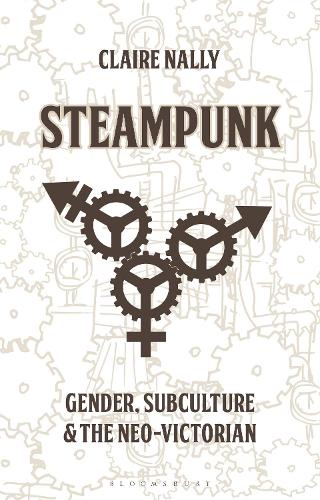
Steampunk: Gender, Subculture and the Neo-Victorian
(Paperback)
Publishing Details
Steampunk: Gender, Subculture and the Neo-Victorian
By (Author) Dr Claire Nally
Bloomsbury Publishing PLC
Bloomsbury Academic
28th January 2021
United Kingdom
Classifications
Tertiary Education
Non Fiction
Film: styles and genres
Media studies
Film history, theory or criticism
306.1
Physical Properties
Paperback
304
Width 138mm, Height 216mm
354g
Description
What is steampunk Fashion craze, literary genre, lifestyle - or all of the above Playing with the scientific innovations and aesthetics of the Victorian era, steampunk creatively warps history and presents an alternative future, imagined from a nineteenth-century perspective. In her interdisciplinary book, Claire Nally delves into this contemporary subculture, explaining how the fashion, music, visual culture, literature and politics of steampunk intersect with theories of gender and sexuality. Exploring and occasionally critiquing the ways in which gender functions in the movement, she addresses a range of different issues, including the controversial trope of the Victorian asylum; gender and the graphic novel; the legacies of colonialism; science and the role of Ada Lovelace as a feminist steampunk icon. Drawing upon interviews, theoretical readings and textual analysis, Nally asks: why are steampunks fascinated by our Victorian heritage, and what strategies do they use to reinvent history in the present
Reviews
Claire Nallys Steampunk: Gender, Subculture, and the Neo-Victorian is a welcome addition to a growing and dynamic field that has much to add to academic discussions around culture, gender, art, and history ... [Nally] lays a strong groundwork for steampunk to not only focus on its subversive potential but also to engage in its reestablishment of norms and mores. * The Journal of the Fantastic in the Arts *
Nallys valuable study makes clear that Steampunk is a popular culture phenomenon that, like punk, goth and metal has developed both conservative and progressive forms ... Having read Steampunk: gender, subculture & the neo-Victorian, I am inspired to get my students researching the genre, which is what a serious piece of scholarship should do. * Journal of Gender Studies *
[A] timely and welcome reflection on the possibilities and limitations of the mode ... Steampunk is a helpful reference for teaching and research in multiple humanities disciplines and it also engages with and advances debates in gender studies, adaptation, neo-Victorianism, and the study of (post-)subculture and counterculture. * C21 Literature: A Journal of Twenty-First Century Writings *
Nallys study is an important and valuable contribution to the field of steampunk studies, as it expands and reflects on opportunities and dangers integral to the steampunk mode, while also providing a nuanced analysis of material which complements neo-Victorian gender studies in new and productive ways. * Neo-Victorian Studies *
Nallys accessible and engaging interdisciplinary study provides a very welcome new perspective on the various repercussions of steampunk. -- Susanne Gruss, lecturer in English Literature and Culture, FAU Erlangen-Nrnberg, Germany
Looking seriously at material productionsfrom corsets, to artworks, to e-zines, to graphic novelsshe asks questions inspired by intersectional feminism and considers whose identities these reflect, [and] whose interests they serve. -- Margaret D. Stetz, Mae and Robert Carter Professor of Women's Studies and Professor of Humanities, University of Delaware, USA
Nally convincingly demonstrates that we need to attend to the particulars of how steampunk is created, received, and even contested, whether in the form of Alan Moore's graphic novels, the multi-genre persona created by Emilie Autumn, or "postfeminist" romance. Her boundary-crossing study thus challenges us to rethink our generalizations about steampunk's joy in anachronism and its fascination with Britain's lost empire. -- Miriam Elizabeth Burstein, Professor of English, State University of New York, College at Brockport, USA
Author Bio
Claire Nally is Senior Lecturer in Twentieth-Century English Literature at the University of Northumbria at Newcastle, UK. Her first book was Envisioning Ireland: W. B. Yeatss Occult Nationalism (2009).
